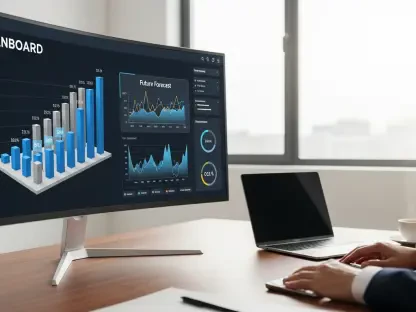In the ever-evolving landscape of data integration and management, Nexla, a prominent platform company, is making waves by integrating the Model Context Protocol (MCP) into its technological framework. This strategic move aligns with its mission to transform any data source into a “data product,” complete with metadata, sample data, comprehensive documentation, and support for multiple protocols. By adding MCP to its suite, Nexla aims to move beyond the traditional data handling approaches and embrace a more universal standard, akin to the role of USB-C ports in technology today. This integration brings a new dimension to data interaction, enhancing Nexla’s capability to handle diverse and complex data flows seamlessly.
Behind this ambitious undertaking is Nexla’s Chief Technology Officer, Amey Desai, who delves into the intricacies involved in embedding MCP within the company’s existing structure. According to Desai, incorporating MCP is not just about adding another protocol—it necessitates a profound level of thinking and engineering expertise. It requires a reevaluation of current systems and methodologies to ensure a smooth transition without compromising existing functionalities. This scenario paints Nexla not only as an innovator in data product integration but also as a thought leader capable of navigating the challenges of the modern data ecosystem.
Unpacking Nexla’s Unique Platform and MCP Integration
Nexla’s platform distinguishes itself with innovative methodologies centered around data abstraction into products known as Nexsets. These Nexsets act as logical manifestations of data, capable of standardizing structured and unstructured sources, including APIs, into easily accessible and manageable forms. By aligning this concept with MCP, Nexla underscores its commitment to providing a uniform handling mechanism that supports diverse integration patterns while ensuring RESTful API accessibility along with other protocols like ELT/ETL and streaming. This allows users to interact with data seamlessly across different environments and applications.
Desai highlights the intricacies of integrating MCP into Nexsets, which involves more than just adding a new protocol. Integration must consider various aspects such as metadata, data standardization, and ensuring compatibility with existing protocols. The innovation here lies in Nexsets’ inherent design that aligns well with MCP principles by offering a unified approach to managing data across disparate systems. This ensures that users experience an AI-enhanced, cohesive interface when interacting with different data sources, truly showcasing Nexla’s adaptability and forward-thinking vision.
Standardizing Data Frameworks with MCP
Nexla’s approach to data integration is further amplified by fostering a standardized framework for data discovery and consumption, aligning closely with MCP resources. With Nexsets, users are offered a marketplace-like environment that provides extensive data accessibility and management on a larger scale. Desai emphasizes the role of AI within this system, showcasing how such integrations enable dynamic exploration of data methods and invocation of operations like transformations and prompt engineering, streamlining data handling to suit modern enterprise needs.
MCP serves as a universal connector, setting a standard client-server architecture that unifies AI application interactions. MCP servers deliver resources, tools, and prompts to optimize Large Language Model results, enhancing contextual understanding for data-driven engagements. For Nexla, this means ensuring all data sources, including non-MCP ones, can be accessed as MCP servers. The platform leverages API Proxying to operate legacy systems, combining agentic orchestration to harmonize differing data sources, delivering an unmatched, seamless interaction that propels user efficiency.
Challenges and Strategic Solutions in MCP Adoption
Despite MCP’s promise of streamlined integration and improved interaction capabilities, certain challenges remain. Desai outlines areas requiring attention, such as creating a more extensive ecosystem to encourage widespread adoption—drawing parallels to the lengthy journey RESTful APIs undertook to become a standard. Furthermore, MCP does not currently incorporate standardized authentication and authorization methods, posing significant security risks as these measures are left to individual integration providers, a concern given APIs’ known vulnerabilities.
Desai highlights these critical issues while proposing solutions like adopting intermediary layers similar to API gateways. Such measures could provide robust security, preventing unauthorized access and potential exploitation by malicious models. This mirrors the best practices in API management, emphasizing the creation of a controlled access environment to thwart possible breaches. By integrating these strategies into its MCP adoption plan, Nexla ensures a secure and efficient interaction ecosystem, instilling confidence in enterprises relying on its technology for critical data operations.
Future-Proofing Through Flexibility and Adaptability
Looking ahead, Desai underscores the necessity of building flexible architectures that can seamlessly adapt to shifting standards and technological advancements. Nexla’s foundation in data products and agentic orchestration resilience positions it well for future MCP developments. By recommending a treatment of MCP akin to API engagements, through gateway models, Nexla aims to ensure stringent access control and data governance, necessary as the protocol matures and evolves.
For other organizations exploring MCP integration, the advice is clear: insulate architecture from potential changes in MCP standards. Nexla’s path, marked by abstraction through data products and a robust orchestration framework, serves as a model for developing adaptable, future-proof data landscapes. By focusing on flexibility and anticipating shifts in MCP specifications, Nexla’s strategy minimizes the risk of extensive rework, ensuring a sustainable and growth-oriented trajectory in the data integration field.
Strategizing for Secure and Efficient Data Interaction
In today’s rapidly changing field of data integration and management, Nexla is making a significant impact by incorporating the Model Context Protocol (MCP) into its technological framework. This strategic decision aligns with Nexla’s mission to convert any data source into a “data product,” enriched with metadata, sample data, detailed documentation, and support for various protocols. By integrating MCP, Nexla aims to transcend traditional data handling and adopt a universal standard, similar to how USB-C has become standard in technology. This addition enhances Nexla’s ability to manage diverse and complicated data flows efficiently. Leading this initiative is Nexla’s Chief Technology Officer, Amey Desai, who explores the complexities of embedding MCP within the company’s current system. Desai highlights that adding MCP goes beyond integrating another protocol; it demands advanced thinking and engineering skills. A reevaluation of existing systems and methods is necessary to ensure a smooth transition without losing current functionalities. This positions Nexla not just as an innovator in data product integration, but also as a thought leader adept at navigating modern data ecosystem challenges.









